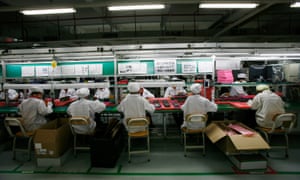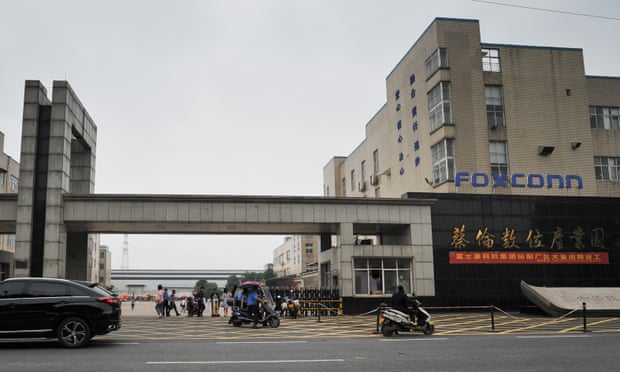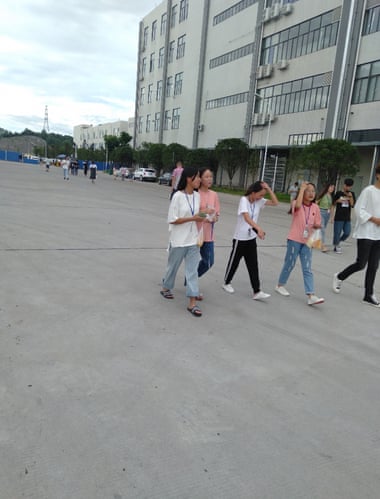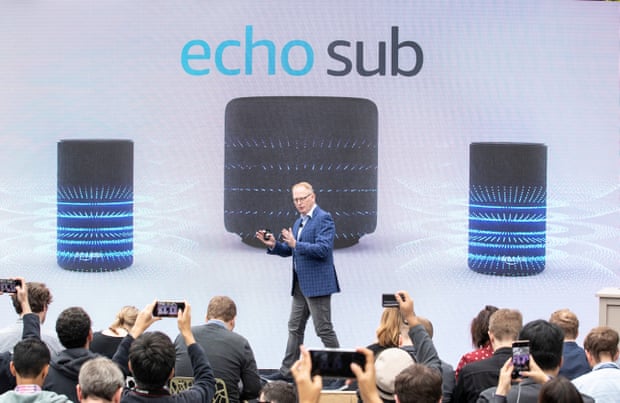Schoolchildren in China work overnight to produce Amazon Alexa devices
Leaked documents show children as young as 16 recruited by Amazon supplier Foxconn work gruelling and illegal hours
Hundreds of schoolchildren have been drafted in to make Amazon’s Alexa devices in China as part of a controversial and often illegal attempt to meet production targets, documents seen by the Guardian reveal.
Interviews with workers and leaked documents from Amazon’s supplierFoxconn show that many of the children have been required to work nights and overtime to produce the smart-speaker devices, in breach of Chinese labour laws.
According to the documents, the teenagers – drafted in from schools and technical colleges in and around the central southern city of Hengyang – are classified as “interns”, and their teachers are paid by the factory to accompany them. Teachers are asked to encourage uncooperative pupils to accept overtime work on top of regular shifts.
Some of the pupils making Amazon’s Alexa-enabled Echo and Echo Dot devices along with Kindles have been required to work for more than two months to supplement staffing levels at the factory during peak production periods, researchers found. More than 1,000 pupils are employed, aged from 16 to 18.
Chinese factories are allowed to employ students aged 16 and older, but these schoolchildren are not allowed to work nights or overtime.
Foxconn, which also makes iPhones for Apple, admitted that students had been employed illegally and said it was taking immediate action to fix the situation.
The company said in a statement: “We have doubled the oversight and monitoring of the internship program with each relevant partner school to ensure that, under no circumstances, will interns [be] allowed to work overtime or nights.
“There have been instances in the past where lax oversight on the part of the local management team has allowed this to happen and, while the impacted interns were paid the additional wages associated with these shifts, this is not acceptable and we have taken immediate steps to ensure it will not be repeated.”
The company defended its use of schoolchildren, however, claiming that “it provides students, who are all of a legal working age, with the opportunity to gain practical work experience and on-the-job training in a number of areas that will support their efforts to find employment following their graduation.”
Foxconn said it would increase the number of regular workers and review salaries immediately.
A spokesperson for Amazon, which is headed by Jeff Bezos, the richest person in the world with a furtune estimated at more than $100bn, said the company would not tolerate violations of its supplier code of conduct and regularly assessed suppliers, often using independent auditors, to monitor compliance and improvement.
“If we find violations, we take appropriate steps, including requesting immediate corrective action,” said the spokesperson.
“We are urgently investigating these allegations and addressing this with Foxconn at the most senior level. Additional teams of specialists arrived on-site yesterday to investigate, and we’ve initiated weekly audits of this issue.”
Teenagers who spoke to researchers said the factory work has no relevance to their courses and they have been pressed into working overtime.
Xiao Fang*, 17, started work at the factory on the Amazon Echo production line last month.
Fang, who is studying computing, was given the task of applying a protective film to about 3,000 Echo Dots each day. Speaking to a researcher, she said she was initially told by her teacher that she would be working eight hours a day, five days a week, but that had since changed to 10 hours a day (including two hours’ overtime) for six days a week.
“The lights in the workshop are very bright, so it gets really hot,” she said.
“In the beginning, I wasn’t very used to working at the factory, and now, after working for a month, I have reluctantly adapted to the work. But working 10 hours a day, every day, is very tiring.
“I tried telling the manager of my line that I didn’t want to work overtime. But the manager notified my teacher and the teacher said if I didn’t work overtime, I could not intern at Foxconn and that would affect my graduation and scholarship applications at the school.
“I had no choice, I could only endure this.”
According to the documents, Foxconn managers need students, who mostly stay in the factory’s dormitories, to work overtime to meet production targets; those who refuse are let go by the factory, researchers found.
A document states: “Student interns who don’t work overtime will not only affect the production goal but also affect their willingness to work. Student interns need to work overtime.”
The documents were leaked to labour rights group China Labor Watch and shared with the Guardian.
They reveal how the factory has turned to schoolchildren to fill the gaps after struggling to recruit permanent staff. One document describes how a factory needs roughly 7,000 workers to handle production from April to October, but says that it is only able to recruit an average of about 30 workers a week and needs to hire agency workers and interns to fill the gap. Interns can account for up to 15% of the workforce.
“To fulfil the shortage of the labour force and lower the cost of labour recruitment, we would like to cooperate with local schools to recruit student interns,” read one document before listing the advantages of recruiting schoolchildren.
“Low labour cost, can hire a large amount of labour at once, easier to reassign additional workers to other positions, strong ability to learn new things.”
Company documents show that Foxconn pays interns a total of 16.54 yuan an hour (£1.93) inclusive of overtime and other add-ons, with a basic salary of £1.18 an hour. Experienced agency workers, known as dispatch workers, cost the company 20.18 yuan an hour. The documents also show that Foxconn has cut the rate paid to interns since last year.
Amazon said in January that it had sold more than 100m Alexa devices which rival Google Home in the market for virtual voice assistants used to control domestic appliances and functions. They cost from around $50 in the US, £50 in the UK and A$79 in Australia, but can be three times more expensive for more sophisticated models.
The factory pays schools 500 yuan a month for each pupil they provide. One company document shows agreements with four schools to provide a total of 900 pupils to work in the factory, though other documents outline plans to recruit up to 1,800 interns this year.
Foxconn’s documents show that the company has wrestled with the issue of hiring schoolchildren as workers but decided that the benefits outweigh the risks.
Notes from a meeting to review the intern-hiring policy on 25 July this year reveal that without students the factory may not be able to hit production targets. The meeting was told that students are cheaper to hire than agency workers, which the factory also uses to cover peak production periods as an alternative to hiring regular staff.
The meeting was told that some children were refusing to work nightshifts and overtime, and there was a need for teachers to intervene.
“Nightshift line leaders should check in with student interns and teachers more often, and report back any abnormal situation so that teachers can persuade students to work nightshifts and overtime.”
If children continued to refuse to work the additional hours, the meeting was told that teachers should file a resignation letter on their behalf.
The student intern recruitment review meeting, which involved staff from the Echo production line, the production control department and the human resources department, reached an agreement to recruit student workers in large numbers. “They advised to recruit student workers to resolve the labour shortage problem during peak season,” a record of the meeting notes.
Amazon agreed a deal with Foxconn in 2017 to add 15 new production lines to the factory and hire thousands of new workers to ramp up production of its Echo and Echo Dot devices and Kindle tablets.
But last year the Observer revealed how the factory was using more agency workers than permitted by Chinese law to avoid having to recruit permanent staff to cover busy months. Many were working overtime hours far in excess of the usual legal limit of 36 hours a month.
In response, Amazon admitted that independent auditors had identified areas of concern at the factory. Foxconn promised to reduce its reliance on agency staff and said agency workers were to be offered the chance to become regular employees.
Commenting on the latest revelations, Li Qiang, executive director of China Labor Watch, called on Amazon and Foxconn to allow independent monitoring of working conditions to prevent breaches of labour law.
“It is only when the company allows independent parties to monitor the working conditions that rights violations at the factory can be effectively addressed,” he said.
“Recruiting a large number of dispatch workers and forcing student workers to work overtime and nightshifts is illegal, and Foxconn is well aware of this. However, because it increases their profits, they will continue to recruit dispatch and student workers.”
The leaked documents also reveal that Foxconn has faced problems as a result of the trade war between the US and China, with the cost of raw materials increasing and some orders lost.









